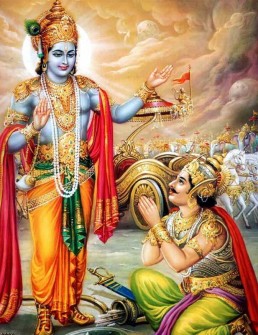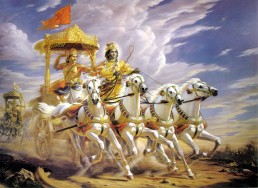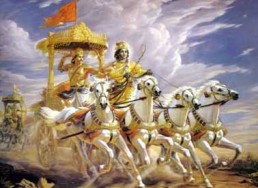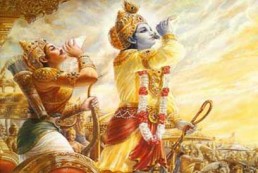Bhagavad Gita-Chapter 5 All Verses with Meaning and Audio
संन्यासं कर्मणां कृष्ण पुनर्योगं च शंससि ।
यच्छ्रेय एतयोरेकं तन्मे ब्रूहि सुनिश्चितम् ॥ ५-१॥
saṃnyāsaṃ karmaṇāṃ kṛṣṇa punaryogaṃ ca śaṃsasi
yacchreya etayorekaṃ tanme brūhi suniścitam 5-1
संन्यासः कर्मयोगश्च निःश्रेयसकरावुभौ ।
तयोस्तु कर्मसंन्यासात्कर्मयोगो विशिष्यते ॥ ५-२॥
saṃnyāsaḥ karmayogaśca niḥśreyasakarāvubhau
tayostu karmasaṃnyāsātkarmayogo viśiṣyate 5-2
निर्द्वन्द्वो हि महाबाहो सुखं बन्धात्प्रमुच्यते ॥ ५-३॥
nirdvandvo hi mahābāho sukhaṃ bandhātpramucyate 5-3
एकमप्यास्थितः सम्यगुभयोर्विन्दते फलम् ॥ ५-४॥
ekamapyāsthitaḥ samyagubhayorvindate phalam 5-4
एकं साङ्ख्यं च योगं च यः पश्यति स पश्यति ॥ ५-५॥
ekaṃ sāṅkhyaṃ ca yogaṃ ca yaḥ paśyati sa paśyati 5-5
योगयुक्तो मुनिर्ब्रह्म नचिरेणाधिगच्छति ॥ ५-६॥
yogayukto munirbrahma nacireṇādhigacchati 5-6
सर्वभूतात्मभूतात्मा कुर्वन्नपि न लिप्यते ॥ ५-७॥
sarvabhūtātmabhūtātmā kurvannapi na lipyate 5-7
पश्यञ्शृण्वन्स्पृशञ्जिघ्रन्नश्नन्गच्छन्स्वपञ्श्वसन् ॥ ५-८॥
paśyañ śṛṇvan spṛśañ jighrann aśnan gacchan svapañ śvasan 5-8
इन्द्रियाणीन्द्रियार्थेषु वर्तन्त इति धारयन् ॥ ५-९॥
indriyāṇīndriyārtheṣu vartanta iti dhārayan 5-9
लिप्यते न स पापेन पद्मपत्रमिवाम्भसा ॥ ५-१०॥
lipyate na sa pāpena padmapatramivāmbhasā 5-10
योगिनः कर्म कुर्वन्ति सङ्गं त्यक्त्वात्मशुद्धये ॥ ५-११॥
yoginaḥ karma kurvanti saṅgaṃ tyaktvātmaśuddhaye 5-11
अयुक्तः कामकारेण फले सक्तो निबध्यते ॥ ५-१२॥
ayuktaḥ kāmakāreṇa phale sakto nibadhyate 5-12
नवद्वारे पुरे देही नैव कुर्वन्न कारयन् ॥ ५-१३॥
navadvāre pure dehī naiva kurvanna kārayan 5-13
न कर्मफलसंयोगं स्वभावस्तु प्रवर्तते ॥ ५-१४॥
na karmaphalasaṃyogaṃ svabhāvastu pravartate 5-14
अज्ञानेनावृतं ज्ञानं तेन मुह्यन्ति जन्तवः ॥ ५-१५॥
ajñānenāvṛtaṃ jñānaṃ tena muhyanti jantavaḥ 5-15
तेषामादित्यवज्ज्ञानं प्रकाशयति तत्परम् ॥ ५-१६॥
teṣāmādityavajjñānaṃ prakāśayati tatparam 5-16
गच्छन्त्यपुनरावृत्तिं ज्ञाननिर्धूतकल्मषाः ॥ ५-१७॥
gacchantyapunarāvṛttiṃ jñānanirdhūtakalmaṣāḥ 5-17
शुनि चैव श्वपाके च पण्डिताः समदर्शिनः ॥ ५-१८॥
śuni caiva śvapāke ca paṇḍitāḥ samadarśinaḥ 5-18
निर्दोषं हि समं ब्रह्म तस्माद् ब्रह्मणि ते स्थिताः ॥ ५-१९॥
nirdoṣaṃ hi samaṃ brahma tasmād brahmaṇi te sthitāḥ 5-19
स्थिरबुद्धिरसम्मूढो ब्रह्मविद् ब्रह्मणि स्थितः ॥ ५-२०॥
sthirabuddhirasammūḍho brahmavid brahmaṇi sthitaḥ 5-20
स ब्रह्मयोगयुक्तात्मा सुखमक्षयमश्नुते ॥ ५-२१॥
sa brahmayogayuktātmā sukhamakṣayamaśnute 5-21
आद्यन्तवन्तः कौन्तेय न तेषु रमते बुधः ॥ ५-२२॥
ādyantavantaḥ kaunteya na teṣu ramate budhaḥ 5-22
कामक्रोधोद्भवं वेगं स युक्तः स सुखी नरः ॥ ५-२३॥
kāmakrodhodbhavaṃ vegaṃ sa yuktaḥ sa sukhī naraḥ 5-23
स योगी ब्रह्मनिर्वाणं ब्रह्मभूतोऽधिगच्छति ॥ ५-२४॥
sa yogī brahmanirvāṇaṃ brahmabhūto’dhigacchati 5-24
छिन्नद्वैधा यतात्मानः सर्वभूतहिते रताः ॥ ५-२५॥
chinnadvaidhā yatātmānaḥ sarvabhūtahite ratāḥ 5-25
अभितो ब्रह्मनिर्वाणं वर्तते विदितात्मनाम् ॥ ५-२६॥
abhito brahmanirvāṇaṃ vartate viditātmanām 5-26
प्राणापानौ समौ कृत्वा नासाभ्यन्तरचारिणौ ॥ ५-२७॥
prāṇāpānau samau kṛtvā nāsābhyantaracāriṇau 5-27
विगतेच्छाभयक्रोधो यः सदा मुक्त एव सः ॥ ५-२८॥
vigatecchābhayakrodho yaḥ sadā mukta eva saḥ 5-28
सुहृदं सर्वभूतानां ज्ञात्वा मां शान्तिमृच्छति ॥ ५-२९॥
ॐ तत्सदिति श्रीमद्भगवद्गीतासूपनिषत्सु
ब्रह्मविद्यायां योगशास्त्रे श्रीकृष्णार्जुनसंवादे
संन्यासयोगो नाम पञ्चमोऽध्यायः ॥ ५॥
suhṛdaṃ sarvabhūtānāṃ jñātvā māṃ śāntimṛcchati 5-29
oṃ tatsaditi śrīmadbhagavadgītāsūpaniṣatsu
brahmavidyāyāṃ yogaśāstre śrīkṛṣṇārjunasaṃvāde
saṃnyāsayogo nāma pañcamo’dhyāyaḥ 5

Description
Bhagavad Gita Chapter 5 Summary
Karma Vairagya Yoga – Action and Renunciation
This chapter stands as a bridge between the action-oriented life extolled by the Lord in the previous two chapers and the life of contemplation that follows in the next. The emphasis here is on renunciation but the Lord makes it clear that this is a state of mind and explains the qualities of a true renunciate. Below are the main themes of Chapter 5:
Verses 1 – 6
The two lifestyles sāṅkhya and yoga
Verses 7 – 12
Karmayoga and its phalam
Verses 13 – 21
Jñānakarmasannyāsa
Verses 22 – 23
Vairāgyam (detachment)
Verses 24 – 26
Videhamukti
Verses 27 – 29
Instruction on meditation
Gita Chapter 5 – Commentary by Swami Paramarthananda
Background
In the fourth chapter, Lord Krishna talked about knowledge and renunciation. He referred to the wiseman as one whose karmas are burnt by the fire of knowledge (IV-19). He glorified the wiseman as one who is free from possessions, whose only activity is the maintenance of the body
(IV-21), and who is happy with anything that comes due to prārabdha-karma (IV-22). Evidently, these are the signs of a monk. At the same time, Krishna concludes the chapter by advising Arjuna to take to action (IV-42). Naturally, Arjuna is not able to reconcile Krishna’s various statements.
(In fact, secluded life and active life are only two lifestyles. The first is called āśrama-sannyāsa [sānkhya, in this chapter] and the latter is called karma-yoga [yoga, in this chapter]. In both the lifestyles, one is identified with the equipments. He is a kartā, and hence a saṃsārī. This shows that lifestyle itself cannot give liberation. When Self-knowledge is gained, one discovers that he is akartā, abhoktā and hence asaṃsārī. Thus, the renunciation of body-identification is true sannyāsa which is called jñānakarma-sannyāsa. This sannyāsa can coexist with active life because it is mental renunciation. But āśrama-sannyāsa cannot co-exist with active life because it is physical renunciation. Krishna is advising Arjuna to remain in the society and attain the goal of jñānakarma-sannyāsa. But Arjuna mistakes the sannyāsa as āśrama-sannyāsa and sees contradiction in Krishna’s teaching.)
So the chapter begins with Arjuna’s doubt as to how a person can remain in duty and be free from actions at the same time (1). Krishna introduces the two lifestyles once again (it was discussed in III-3) and says that either of the lifestyles can help a person in getting mokṣa (through knowledge). What is necessary in both lifestyles is a relative freedom from rāga and dveṣa which is an important condition for Self-knowledge. Of these two, Krishna recommends active life as ideal for a common man. As the Lord Himself points out, a secluded life is difficult to pursue without maturity (2 to 6).
In the next six verses, the Lord talks about karmayoga and the stages of progress. A karmayogī dedicates all his physical and mental actions to the Lord without concern for the result. Because of this attitude, the results do not cause any reactions in his mind. Gradually, he develops self-control and ultimately discovers his true nature which is the same in all beings. (Of course, this is accomplished through the teaching of a guru alone.) This is called jñānakarma-sannyāsa (7 to 12).
In the following verses (13 to 21), Krishna discussed the characteristics of a wiseman and his wisdom. Since he has discovered his identity with the pure Self, his nature is the same as that of the Self. In His presence all the organs function. Neither does He act nor does He instigate anyone. According to their nature, the organs act and reap results. He is beyond good and evil results.
Still, because of ignorance, one is deluded (15). When Self-ignorance is destroyed by Self-knowledge, Brahman, which is the true nature, becomes evident (16).
Being spontaneously established in Brahman through the pursuit of śravaṇam, mananam, and nididhyāsanam, these wisemen revel only in Brahman. Thus, freed from all impurities, they attain videhamukti from where there is no return (17). They recognize the one homogeneous awareness-existence which is behind all beings as their substratum (18). Thus, having discovered the identity with the defectless, ever unaffected Brahman, they overcome mortality here itself (19). Though prārabdha brings favorable and unfavorable situations, these spontaneous, delusion-free wisemen are neither elated nor depressed (20). Detached from the world and established in Brahman, they enjoy infinite ānanda (21).
In the next two verses, the qualification of vairāgyam is stressed. Unless a seeker gets detached from sensual pleasures, he cannot attain infinite ānanda. A discriminative seeker who knows the impermanence of these contact-born pleasures will not indulge in them (22). And, one who can restrain the impulse of kāma (desire) and krodha (anger) alone is a man of self-control fit to enjoy life (23).
Now (24 to 26) the Lord talks about videhamukti. Jīvanmuktās who revel in themselves, who are pure-minded, who love all beings, and who have doubtless knowledge of the Ātmā attain oneness with Brahman (videhamukti) at the fall of the body.
Having clarified Arjuna’s doubt, Krishna gives a brief reference to meditation in the last three verses which will be discussed elaborately in the next chapter.
(Though doubtless knowledge can be attained by śravaṇam, and mananam, the habitual notion that “I am the body” does not allow the knowledge to manifest as joy. Hence one has to assimilate this teaching by dwelling upon it, which is called nididhyāsanam).
Having removed all (thoughts of) sense objects, having withdrawn the sense organs, having regulated the breathing, and freed from desire, fear, and anger, one should meditate with a desire for mokṣa. Such a yogī (meditator) becomes liberated forever (27, 28).
Knowing the Lord who is the receiver of all sacrifices, who is the supreme Lord of all worlds, and who is the friend of all beings the wiseman attains peace (29).
Gita 5th Chapter – Main Points
1. The two lifestyles sāṅkhya and yoga: 1 to 6
2. Karmayoga and its phalam: 7 to 12
3. Jñānakarmasannyāsa: 13 to 21
4. Vairāgyam (detachment): 22 to 23
5. Videhamukti: 24 to 26
6. Instruction on meditation: 27 to 29
Since the main topic is sannyāsa (renunciation), this chapter is called Sannyāsa-yoga.
Other Bhagavad Gita Shlokams
Bhagavad Gita
The Bhagavad Gita, or the Song of the Lord, is a dialogue between Krishna, an incarnation of Vishnu, and his friend and disciple, Arjuna. Composed of 701 Shlokas arranged in 18 chapters, the Gita is one of the best-known philosophical texts of…
Bhagavad Gita-Chapter 01 All Verses with Meaning and Audio
Bhagavad Gita Chapter 1 All Verses for easy chanting along with Audio and Meaning. Lyrics In English, Sanskrit, Hindi, Telugu, Tamil, Gujarati, Bengali and many more languages.
Bhagavad Gita-Chapter 02 All Verses with Meaning and Audio
Bhagavad Gita Chapter 2 All Verses for easy chanting along with Audio and Meaning. Lyrics In English, Sanskrit, Hindi, Telugu, Tamil, Gujarati, Bengali and many more languages.
Bhagavad Gita-Chapter 03 All Verses with Meaning and Audio
Bhagavad Gita Chapter 3 All Verses for easy chanting along with Audio and Meaning. Lyrics In English, Sanskrit, Hindi, Telugu, Tamil, Gujarati, Bengali and many more languages.
Bhagavad Gita-Chapter 04 All Verses with Meaning and Audio
Bhagavad Gita Chapter 4 All Verses for easy chanting along with Audio and Meaning. Lyrics In English, Sanskrit, Hindi, Telugu, Tamil, Gujarati, Bengali and many more languages.
Bhagavad Gita-Chapter 06 All Verses with Meaning and Audio
Bhagavad Gita Chapter 6 All Verses for easy chanting along with Audio and Meaning. Lyrics In English, Sanskrit, Hindi, Telugu, Tamil, Gujarati, Bengali and many more languages.
Bhagavad Gita-Chapter 07 All Verses with Meaning and Audio
Bhagavad Gita Chapter 7 All Verses for easy chanting along with Audio and Meaning. Lyrics In English, Sanskrit, Hindi, Telugu, Tamil, Gujarati, Bengali and many more languages.
Bhagavad Gita-Chapter 08 All Verses with Meaning and Audio
Bhagavad Gita Chapter 8 All Verses for easy chanting along with Audio and Meaning. Lyrics In English, Sanskrit, Hindi, Telugu, Tamil, Gujarati, Bengali and many more languages.
Bhagavad Gita-Chapter 09 All Verses with Meaning and Audio
Bhagavad Gita Chapter 9 All Verses for easy chanting along with Audio and Meaning. Lyrics In English, Sanskrit, Hindi, Telugu, Tamil, Gujarati, Bengali and many more languages.
Bhagavad Gita-Chapter 10 All Verses with Meaning and Audio
Bhagavad Gita Chapter 10 All Verses for easy chanting along with Audio and Meaning. Lyrics In English, Sanskrit, Hindi, Telugu, Tamil, Gujarati, Bengali and many more languages.
Bhagavad Gita-Chapter 11 All Verses with Meaning and Audio
Bhagavad Gita Chapter 11 All Verses for easy chanting along with Audio and Meaning. Lyrics In English, Sanskrit, Hindi, Telugu, Tamil, Gujarati, Bengali and many more languages.
Bhagavad Gita-Chapter 12 All Verses with Meaning and Audio
Bhagavad Gita Chapter 12 All Verses for easy chanting along with Audio and Meaning. Lyrics In English, Sanskrit, Hindi, Telugu, Tamil, Gujarati, Bengali and many more languages.
Bhagavad Gita-Chapter 13 All Verses with Meaning and Audio
Bhagavad Gita Chapter 13 All Verses for easy chanting along with Audio and Meaning. Lyrics In English, Sanskrit, Hindi, Telugu, Tamil, Gujarati, Bengali and many more languages.
Bhagavad Gita-Chapter 14 All Verses with Meaning and Audio
Bhagavad Gita Chapter 14 All Verses for easy chanting along with Audio and Meaning. Lyrics In English, Sanskrit, Hindi, Telugu, Tamil, Gujarati, Bengali and many more languages.
Bhagavad Gita-Chapter 15 All Verses with Meaning and Audio
Bhagavad Gita Chapter 15 All Verses for easy chanting along with Audio and Meaning. Lyrics In English, Sanskrit, Hindi, Telugu, Tamil, Gujarati, Bengali and many more languages.
Bhagavad Gita-Chapter 16 All Verses with Meaning and Audio
Bhagavad Gita Chapter 16 All Verses for easy chanting along with Audio and Meaning. Lyrics In English, Sanskrit, Hindi, Telugu, Tamil, Gujarati, Bengali and many more languages.
Bhagavad Gita-Chapter 17 All Verses with Meaning and Audio
Bhagavad Gita Chapter 17 All Verses for easy chanting along with Audio and Meaning. Lyrics In English, Sanskrit, Hindi, Telugu, Tamil, Gujarati, Bengali and many more languages.
Bhagavad Gita-Chapter 18 All Verses with Meaning and Audio
Bhagavad Gita Chapter 18 All Verses for easy chanting along with Audio and Meaning. Lyrics In English, Sanskrit, Hindi, Telugu, Tamil, Gujarati, Bengali and many more languages.
Gita Dhyanam
The Gītā Dhyānam, also called the Gītā Dhyāna or the Dhyāna Ślokas associated with the Gītā, is a 9-verse Sanskrit poem that has often been attached to the Bhagavad Gita, one of the most important scr
Bhagavad Gita-Chapter 5 All Verses with Meaning and Audio – Bhagavad Gita – Bhagavad Gita Chapter 5 All Verses Easy Chanting with Audio and Meaning, Lyrics



